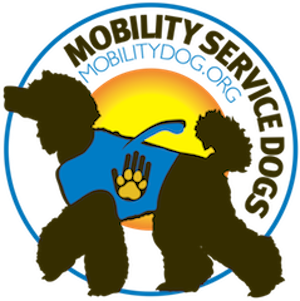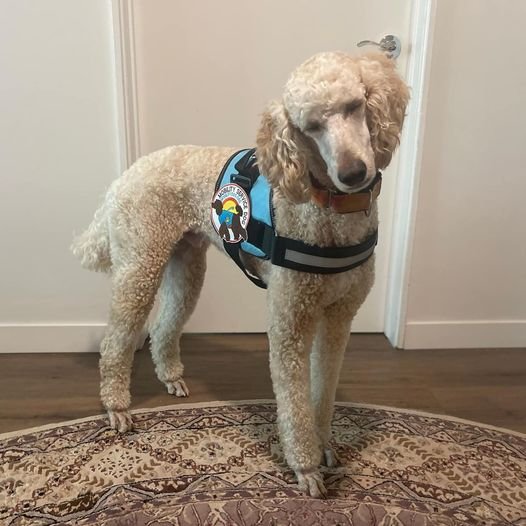When the Disability Changes: Can a Service Dog Learn a New Task?
Finley, Our Newest Poodle Service Dog in Training
The simple answer is yes. But there may be situations when using another service dog to perform different tasks may be preferable.
Service dogs or medical dogs are incredible canines trained to fulfill specific tasks on cue for a disabled person. A service dog is legally recognized as a necessary “medical device,” just like an oxygen tank, crutches, a wheelchair and more.
But, when the disability changes, can a service dog learn a new task to help their handler? Whether one dog can handle it all may depend on the individual dog.
One Service Dog, Many Tasks?
Winston, a Mobility Service Dog
While technically, service dogs should be able to handle a variety of learned tasks, it’s critical to evaluate the specific dog’s:
Intelligence.
Personality.
Temperament.
Loyalty.
Reactive skills; and
Overall focus.
Every service dog requires:
A special personality that is receptive to rigorous training and learning (220 hours).
Specific traits for specific tasks.
The ongoing ability to fulfill high expectations daily (see our blog “Can My Dog Become a Service Dog?”).
Not every dog can live up to the job of being a service dog. Also, not every service dog may be able to handle a large and diverse variety of tasks or the additional burden of new tasks for the disabled person whose independence and freedom are dependent upon the service dog’s assistance.
Another factor that may come into play is the dog’s age and whether he can learn new tasks and effectively carry them out for the disabled handler whose health and safety are at stake.
Service Dog and Specific Tasks
Polina and Ollie
Typically, service dogs are trained for specific tasks including:
Mobility/Stability (our focus).
Alerting.
Guiding.
Retrieving.
PTSD.
Autism, psychiatric assistance and more.
But when the disability changes, is it possible for the current service dog to be retrained to meet the need? Yes, it is and these canines are called multi-purpose service dogs.
Multi-Purpose Service Dogs
These canines are specifically trained to perform a wide range of tasks tailored to assist a disabled individual’s unique needs.
Did you know that it’s not uncommon for people to have more than one disability? Sometimes “one disability can predispose a person to an additional disability” that may require assistance from a trained service dog.
According to CooperativePaws.com, up to 40% of people with Chronic Obstructive Pulmonary Disease (COPD) also deal with depression.
Also, someone injured in a car accident may suffer a traumatic brain injury (TMI) along with mobility challenges.
Another example involves someone living with multiple sclerosis (MS) which can also negatively affect their emotions and even vision.
Janie Heinrich and Her Mobility Service Dog
Such disabilities may require a trained, “multi-purpose service dog” with highly specialized skills. While training a new service dog or retraining a current service dog, it’s very important to prioritize all the required tasks for each disability and ensure the workload is manageable for the dog.
If this is not possible, several service dogs may need to be trained to address each disability separately for the handler. (If a disabled individual requires 2 service dogs to assist them, the ADA allows both dogs to be allowed into a public space if they can be reasonably accommodated.)
When a service dog needs to learn an additional task, it is important for everyone involved to work together as a cohesive team:
The medical staff for a deep understanding of the diagnosis/diagnoses and symptoms.
The dog trainer to train new tasks or adapt current skills to the new challenges the handler faces.
The handler so the service dog team is ready and capable of effectively and consistently handling new challenges.
Whether a current service dog will be retrained or a brand-new dog will be trained and added, it all depends on what is best for the dog(s) and the person!
(All Images Courtesy of MobilityDog.org)
The MobilityDog Logo
Mobility Service Dogs West Coast Project
The MSD-WCP was founded in 2018 with the express mission of supporting the Mobility-disabled community.
Learn about our organization’s mission and how you can help here!
Want to support our work? Just text PAW to 44-321!





